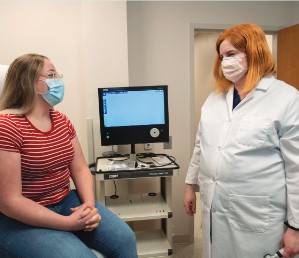Swimming isn’t always the cause of this painful condition.
With water beckoning at the shore, lakes, rivers, pools and water parks, hot summer months are prime time for swimmer’s ear—a condition that’s common but sometimes misunderstood.

Christina Gillespie, MD, a pediatric and adult otolaryngologist and an RWJBarnabas Health Medical Group provider affiliated with Community Medical Center, explains what causes the painful ailment and how to avoid it.
What is swimmer’s ear?
It’s an infection of the outer ear canal, which runs from the eardrum to outside the head. It occurs in all age groups, from babies to older adults, and common symptoms include pain, a feeling of fullness in the ear and fluid drainage. Some people complain of hearing loss. Often, patients feel like they have water, a foreign body or sand trapped in the ear.
Why does it happen?
Swimmer’s ear is often caused by exposure to bacteria- contaminated water or by moisture that sits in the ear for extended periods, possibly because something obstructs the ear canal and prevents water from draining properly.
But you don’t have to swim to get swimmer’s ear. It can be caused by anything that creates an environment where bacteria can thrive, including sweat, high humidity or an abrasion or break in the ear’s skin that gives bacteria an entry to the body and makes you more susceptible to an infection. Use of hearing aids or earbuds can increase risks. Other people at risk include those who have an underlying skin condition such as dermatitis or eczema.
How is it treated?
Swimmer’s ear is best treated with antibiotic eardrops. Occasionally, if the infection is severe, a person may also need oral antibiotics. We don’t recommend using over-the-counter treatments like hydrogen peroxide or drying drops, because they can aggravate conditions in the ears. If you develop pain or redness in your ears, you’re best off having a physician check you out.
How can you prevent swimmer’s ear?
Don’t swim in water with posted high bacterial counts. Avoid inserting potentially damaging objects like cotton-tipped swabs into ears. If you develop an infection associated with hearing aid use, allow time during the day to let ears air out. If it’s associated with a dermatologic problem, work to manage your skin condition better and keep ears clean. If it’s associated with inserting earbuds, try to use them less.
For more information or to make an appointment with Dr. Gillespie, call 848-287-6032.
